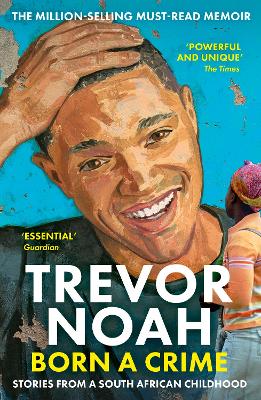This book is amazing. That is all. Go preorder it.
I was reading this on my Kindle app and was highlighting like crazy. Trevor Noah has been an outsider all his life. In South Africa under apartheid there were four racial categories - white, black, colored, and Indian. Colored people were the descendants of interracial relationships in the past. There was no category for 50/50 black/white children because it couldn't legally happen. He chose to identify as black because that's what his mother was but he wasn't accepted there either.
Growing up both defined by and outside of such a strict racial hierarchy sharpened his insights.
"That is the curse of being black and poor, and it is a curse that follows you from generation to generation. My mother calls it "the black tax." Because the generations who came before you have been pillaged, rather than being free to use your skills and education to move forward, you lose everything just trying to bring everyone behind you back up to zero."
"British racism said, "If the monkey can walk like a man and talk like a man, then perhaps he is a man." Afrikaner racism said, "Why give a book to a monkey?"
He talks about history when describing why having a friend named Hitler wasn't considered strange.
"Every country thinks their history is the most important, and that's especially true in the West. But if black South Africans could go back in time and kill one person, Cecil Rhodes would come up before Hitler. If people in the Congo could go back in time and kill one person, Belgium's King Leopold would come way before Hitler. If Native Americans could go back in time and kill one person, it would probably be Christopher Columbus or Andrew Jackson."
"Holocaust victims count because Hitler counted them. Six million people killed. We can all look at that number and rightly be horrified. But when you read through the history of atrocities against Africans, there are no numbers, only guesses. It's harder to be horrified by a guess."
This is the story of growing up illegally because his mother fought to make a place for him even before the fall of apartheid. She was a visionary. However, even after apartheid there wasn't a place for him to make a legal living as easily as it was to make an illegal one in the townships. He talks about the saying about teaching a man to fish vs giving him a fish. He points out that it doesn't work if you don't also help him get a fishing pole.
This isn't the story of how he became a comedian or how he ended up taking over for Jon Stewart as the host of The Daily Show. That all comes later. This is the story of the world that shaped him into the person he is today. It is funny. It is horrifying. It is necessary reading.
I received this book from NetGalley.
This review was originally posted on Based On A True Story
